UK Law: Classifications, Sources, Law Making Process & Employment Law
VerifiedAdded on 2023/06/14
|10
|2722
|123
Report
AI Summary
This report provides a comprehensive overview of the UK legal system, beginning with a definition of law and an examination of the UK's legal structure as a constitutional monarchy based on common law. It elaborates on the classifications of law, specifically civil and criminal law, and discusses the role of courts, including the High Court and Supreme Court, within the English Legal System. The report further explores the sources of law, focusing on case law and the formation of legislation, including an explanation of delegated legislation. Finally, it examines the impact of UK law-making on commercial organizations, with a specific focus on employment law, including statutory duties of employers and actions related to wrongful and unfair dismissal.
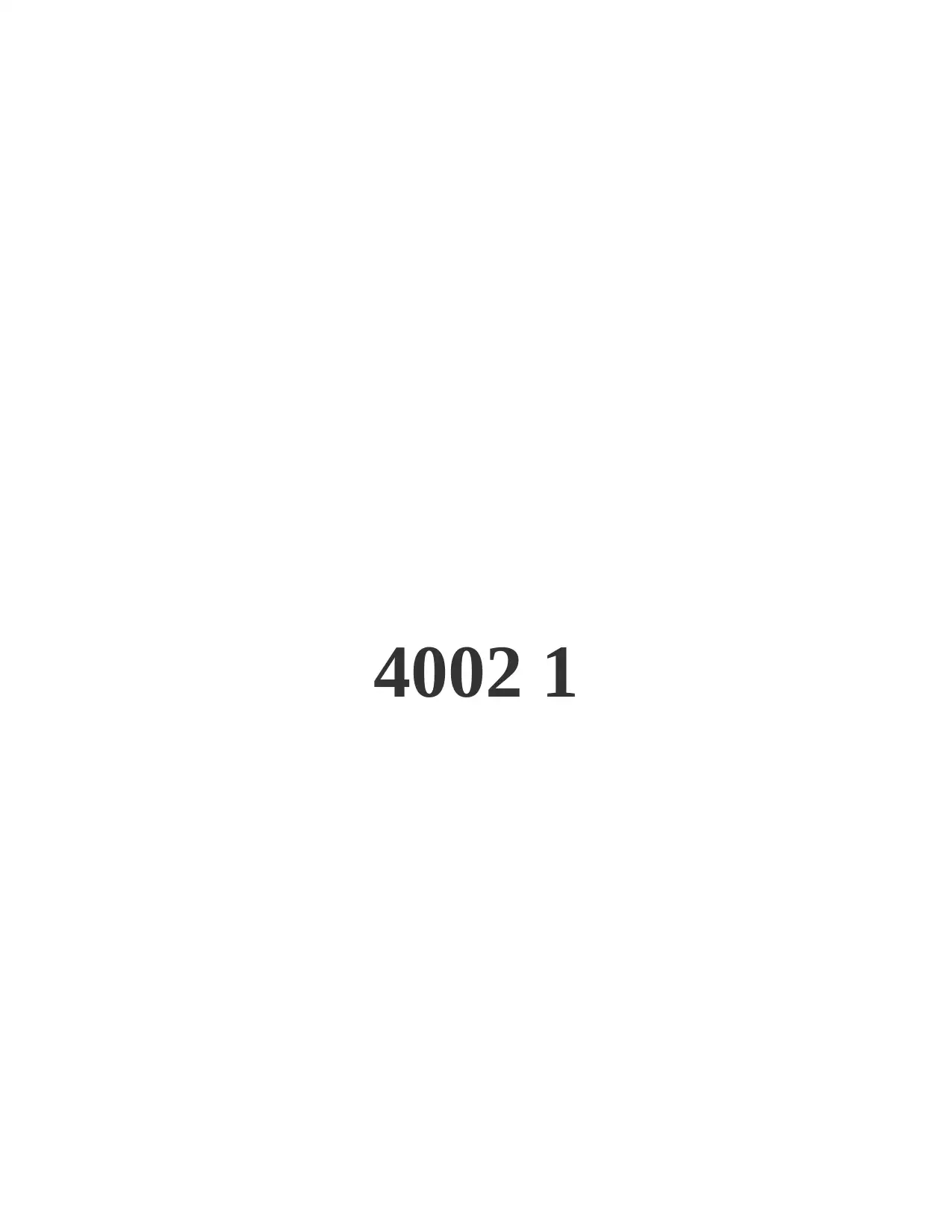
4002 1
Paraphrase This Document
Need a fresh take? Get an instant paraphrase of this document with our AI Paraphraser
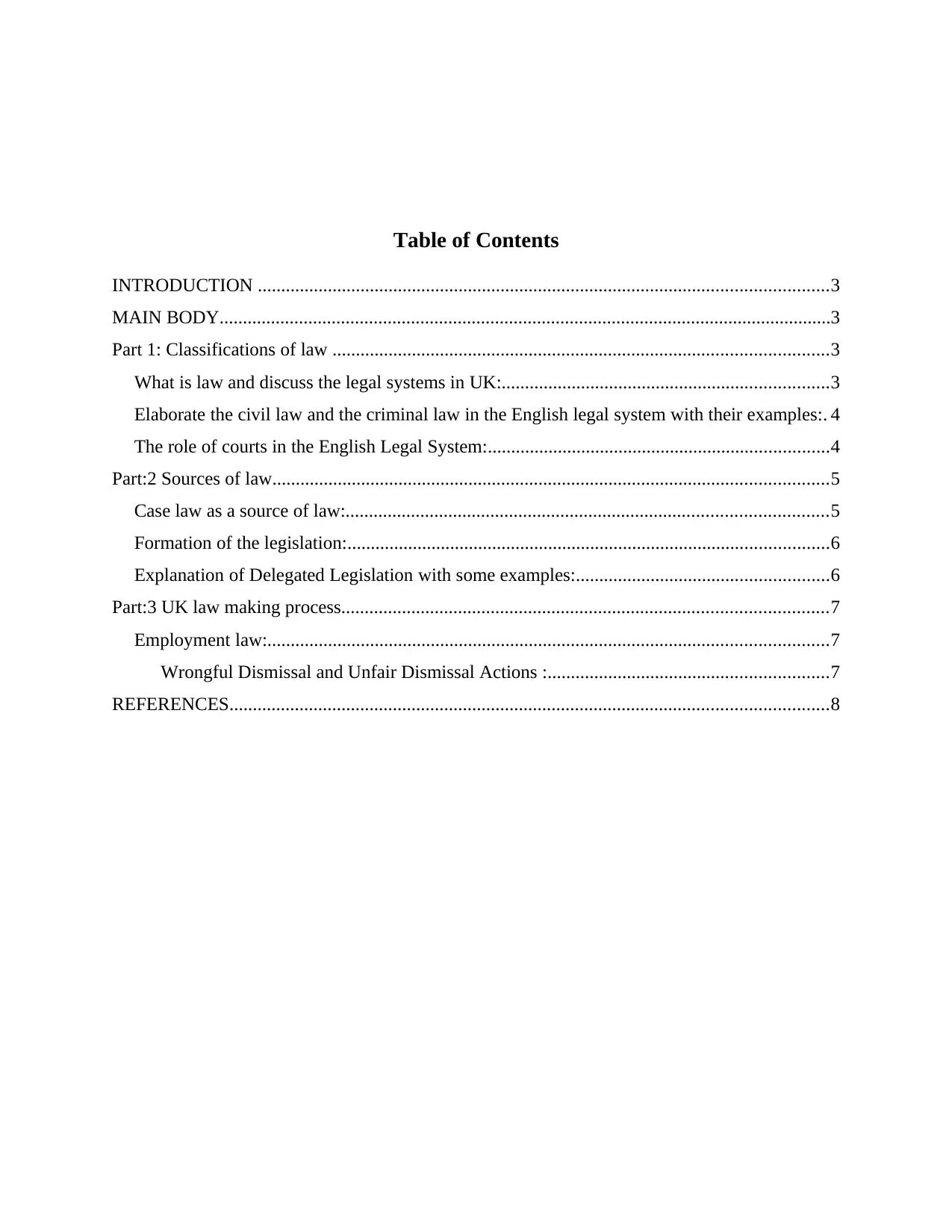
Table of Contents
INTRODUCTION ..........................................................................................................................3
MAIN BODY...................................................................................................................................3
Part 1: Classifications of law ..........................................................................................................3
What is law and discuss the legal systems in UK:......................................................................3
Elaborate the civil law and the criminal law in the English legal system with their examples:. 4
The role of courts in the English Legal System:.........................................................................4
Part:2 Sources of law.......................................................................................................................5
Case law as a source of law:.......................................................................................................5
Formation of the legislation:.......................................................................................................6
Explanation of Delegated Legislation with some examples:......................................................6
Part:3 UK law making process........................................................................................................7
Employment law:........................................................................................................................7
Wrongful Dismissal and Unfair Dismissal Actions :............................................................7
REFERENCES................................................................................................................................8
INTRODUCTION ..........................................................................................................................3
MAIN BODY...................................................................................................................................3
Part 1: Classifications of law ..........................................................................................................3
What is law and discuss the legal systems in UK:......................................................................3
Elaborate the civil law and the criminal law in the English legal system with their examples:. 4
The role of courts in the English Legal System:.........................................................................4
Part:2 Sources of law.......................................................................................................................5
Case law as a source of law:.......................................................................................................5
Formation of the legislation:.......................................................................................................6
Explanation of Delegated Legislation with some examples:......................................................6
Part:3 UK law making process........................................................................................................7
Employment law:........................................................................................................................7
Wrongful Dismissal and Unfair Dismissal Actions :............................................................7
REFERENCES................................................................................................................................8
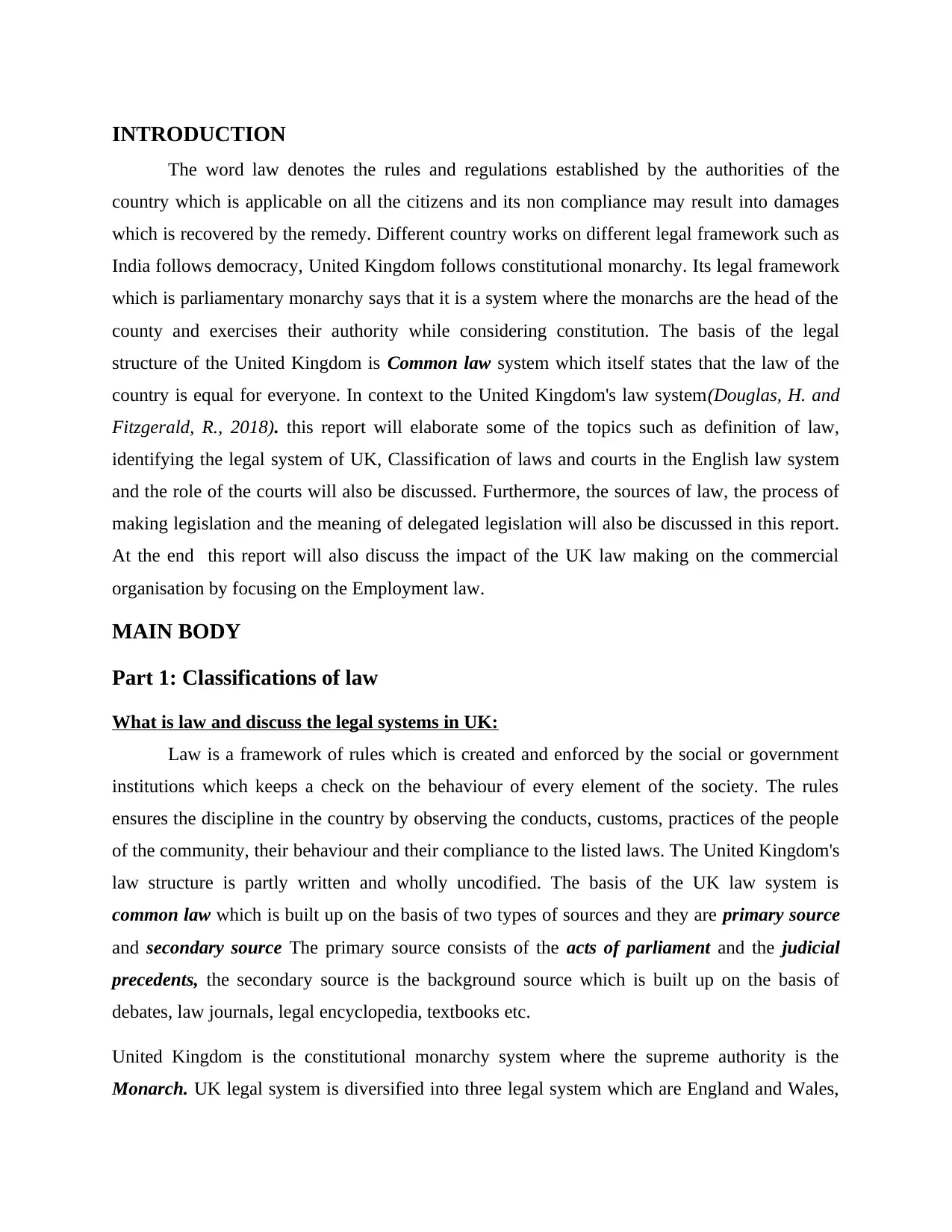
INTRODUCTION
The word law denotes the rules and regulations established by the authorities of the
country which is applicable on all the citizens and its non compliance may result into damages
which is recovered by the remedy. Different country works on different legal framework such as
India follows democracy, United Kingdom follows constitutional monarchy. Its legal framework
which is parliamentary monarchy says that it is a system where the monarchs are the head of the
county and exercises their authority while considering constitution. The basis of the legal
structure of the United Kingdom is Common law system which itself states that the law of the
country is equal for everyone. In context to the United Kingdom's law system(Douglas, H. and
Fitzgerald, R., 2018). this report will elaborate some of the topics such as definition of law,
identifying the legal system of UK, Classification of laws and courts in the English law system
and the role of the courts will also be discussed. Furthermore, the sources of law, the process of
making legislation and the meaning of delegated legislation will also be discussed in this report.
At the end this report will also discuss the impact of the UK law making on the commercial
organisation by focusing on the Employment law.
MAIN BODY
Part 1: Classifications of law
What is law and discuss the legal systems in UK:
Law is a framework of rules which is created and enforced by the social or government
institutions which keeps a check on the behaviour of every element of the society. The rules
ensures the discipline in the country by observing the conducts, customs, practices of the people
of the community, their behaviour and their compliance to the listed laws. The United Kingdom's
law structure is partly written and wholly uncodified. The basis of the UK law system is
common law which is built up on the basis of two types of sources and they are primary source
and secondary source The primary source consists of the acts of parliament and the judicial
precedents, the secondary source is the background source which is built up on the basis of
debates, law journals, legal encyclopedia, textbooks etc.
United Kingdom is the constitutional monarchy system where the supreme authority is the
Monarch. UK legal system is diversified into three legal system which are England and Wales,
The word law denotes the rules and regulations established by the authorities of the
country which is applicable on all the citizens and its non compliance may result into damages
which is recovered by the remedy. Different country works on different legal framework such as
India follows democracy, United Kingdom follows constitutional monarchy. Its legal framework
which is parliamentary monarchy says that it is a system where the monarchs are the head of the
county and exercises their authority while considering constitution. The basis of the legal
structure of the United Kingdom is Common law system which itself states that the law of the
country is equal for everyone. In context to the United Kingdom's law system(Douglas, H. and
Fitzgerald, R., 2018). this report will elaborate some of the topics such as definition of law,
identifying the legal system of UK, Classification of laws and courts in the English law system
and the role of the courts will also be discussed. Furthermore, the sources of law, the process of
making legislation and the meaning of delegated legislation will also be discussed in this report.
At the end this report will also discuss the impact of the UK law making on the commercial
organisation by focusing on the Employment law.
MAIN BODY
Part 1: Classifications of law
What is law and discuss the legal systems in UK:
Law is a framework of rules which is created and enforced by the social or government
institutions which keeps a check on the behaviour of every element of the society. The rules
ensures the discipline in the country by observing the conducts, customs, practices of the people
of the community, their behaviour and their compliance to the listed laws. The United Kingdom's
law structure is partly written and wholly uncodified. The basis of the UK law system is
common law which is built up on the basis of two types of sources and they are primary source
and secondary source The primary source consists of the acts of parliament and the judicial
precedents, the secondary source is the background source which is built up on the basis of
debates, law journals, legal encyclopedia, textbooks etc.
United Kingdom is the constitutional monarchy system where the supreme authority is the
Monarch. UK legal system is diversified into three legal system which are England and Wales,
⊘ This is a preview!⊘
Do you want full access?
Subscribe today to unlock all pages.

Trusted by 1+ million students worldwide
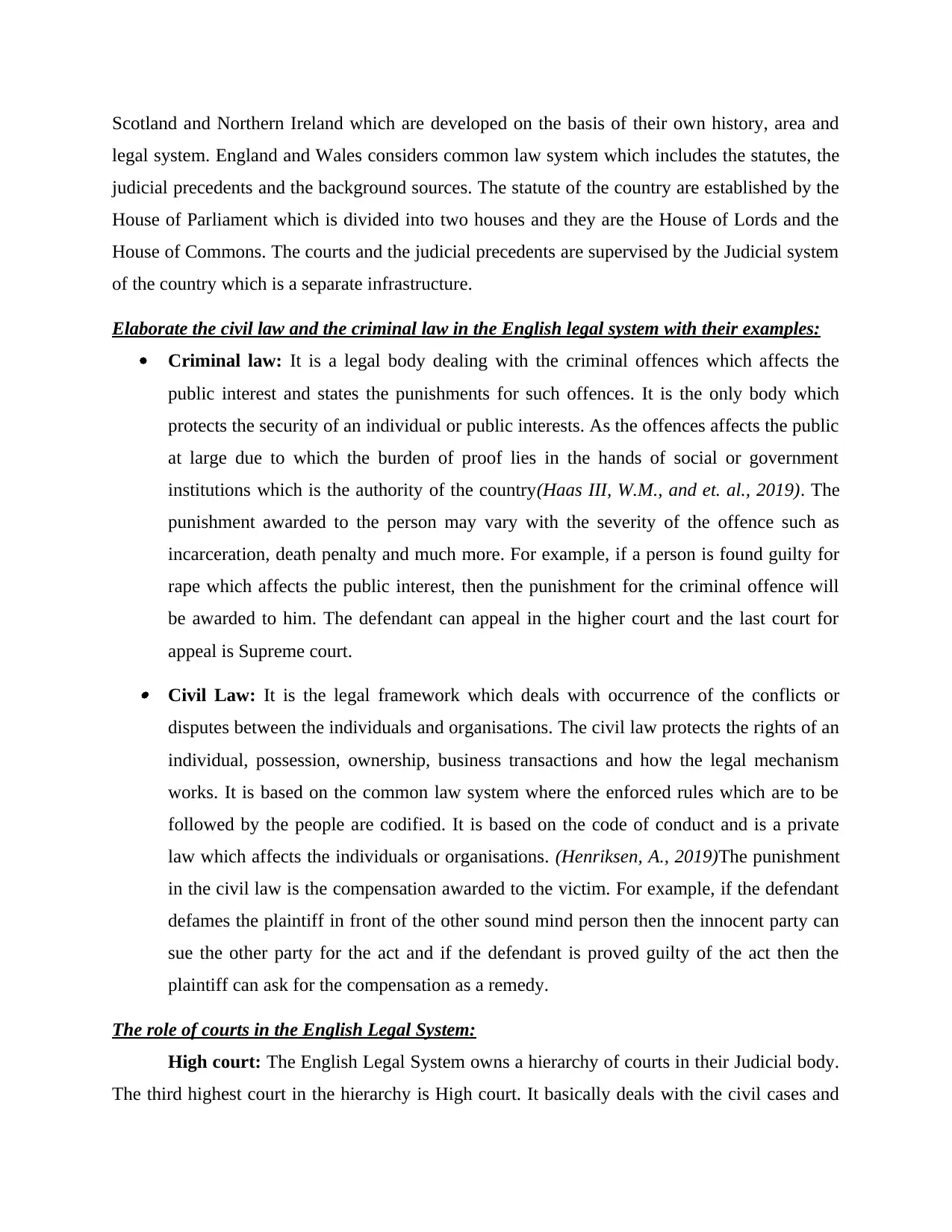
Scotland and Northern Ireland which are developed on the basis of their own history, area and
legal system. England and Wales considers common law system which includes the statutes, the
judicial precedents and the background sources. The statute of the country are established by the
House of Parliament which is divided into two houses and they are the House of Lords and the
House of Commons. The courts and the judicial precedents are supervised by the Judicial system
of the country which is a separate infrastructure.
Elaborate the civil law and the criminal law in the English legal system with their examples:
Criminal law: It is a legal body dealing with the criminal offences which affects the
public interest and states the punishments for such offences. It is the only body which
protects the security of an individual or public interests. As the offences affects the public
at large due to which the burden of proof lies in the hands of social or government
institutions which is the authority of the country(Haas III, W.M., and et. al., 2019). The
punishment awarded to the person may vary with the severity of the offence such as
incarceration, death penalty and much more. For example, if a person is found guilty for
rape which affects the public interest, then the punishment for the criminal offence will
be awarded to him. The defendant can appeal in the higher court and the last court for
appeal is Supreme court. Civil Law: It is the legal framework which deals with occurrence of the conflicts or
disputes between the individuals and organisations. The civil law protects the rights of an
individual, possession, ownership, business transactions and how the legal mechanism
works. It is based on the common law system where the enforced rules which are to be
followed by the people are codified. It is based on the code of conduct and is a private
law which affects the individuals or organisations. (Henriksen, A., 2019)The punishment
in the civil law is the compensation awarded to the victim. For example, if the defendant
defames the plaintiff in front of the other sound mind person then the innocent party can
sue the other party for the act and if the defendant is proved guilty of the act then the
plaintiff can ask for the compensation as a remedy.
The role of courts in the English Legal System:
High court: The English Legal System owns a hierarchy of courts in their Judicial body.
The third highest court in the hierarchy is High court. It basically deals with the civil cases and
legal system. England and Wales considers common law system which includes the statutes, the
judicial precedents and the background sources. The statute of the country are established by the
House of Parliament which is divided into two houses and they are the House of Lords and the
House of Commons. The courts and the judicial precedents are supervised by the Judicial system
of the country which is a separate infrastructure.
Elaborate the civil law and the criminal law in the English legal system with their examples:
Criminal law: It is a legal body dealing with the criminal offences which affects the
public interest and states the punishments for such offences. It is the only body which
protects the security of an individual or public interests. As the offences affects the public
at large due to which the burden of proof lies in the hands of social or government
institutions which is the authority of the country(Haas III, W.M., and et. al., 2019). The
punishment awarded to the person may vary with the severity of the offence such as
incarceration, death penalty and much more. For example, if a person is found guilty for
rape which affects the public interest, then the punishment for the criminal offence will
be awarded to him. The defendant can appeal in the higher court and the last court for
appeal is Supreme court. Civil Law: It is the legal framework which deals with occurrence of the conflicts or
disputes between the individuals and organisations. The civil law protects the rights of an
individual, possession, ownership, business transactions and how the legal mechanism
works. It is based on the common law system where the enforced rules which are to be
followed by the people are codified. It is based on the code of conduct and is a private
law which affects the individuals or organisations. (Henriksen, A., 2019)The punishment
in the civil law is the compensation awarded to the victim. For example, if the defendant
defames the plaintiff in front of the other sound mind person then the innocent party can
sue the other party for the act and if the defendant is proved guilty of the act then the
plaintiff can ask for the compensation as a remedy.
The role of courts in the English Legal System:
High court: The English Legal System owns a hierarchy of courts in their Judicial body.
The third highest court in the hierarchy is High court. It basically deals with the civil cases and
Paraphrase This Document
Need a fresh take? Get an instant paraphrase of this document with our AI Paraphraser
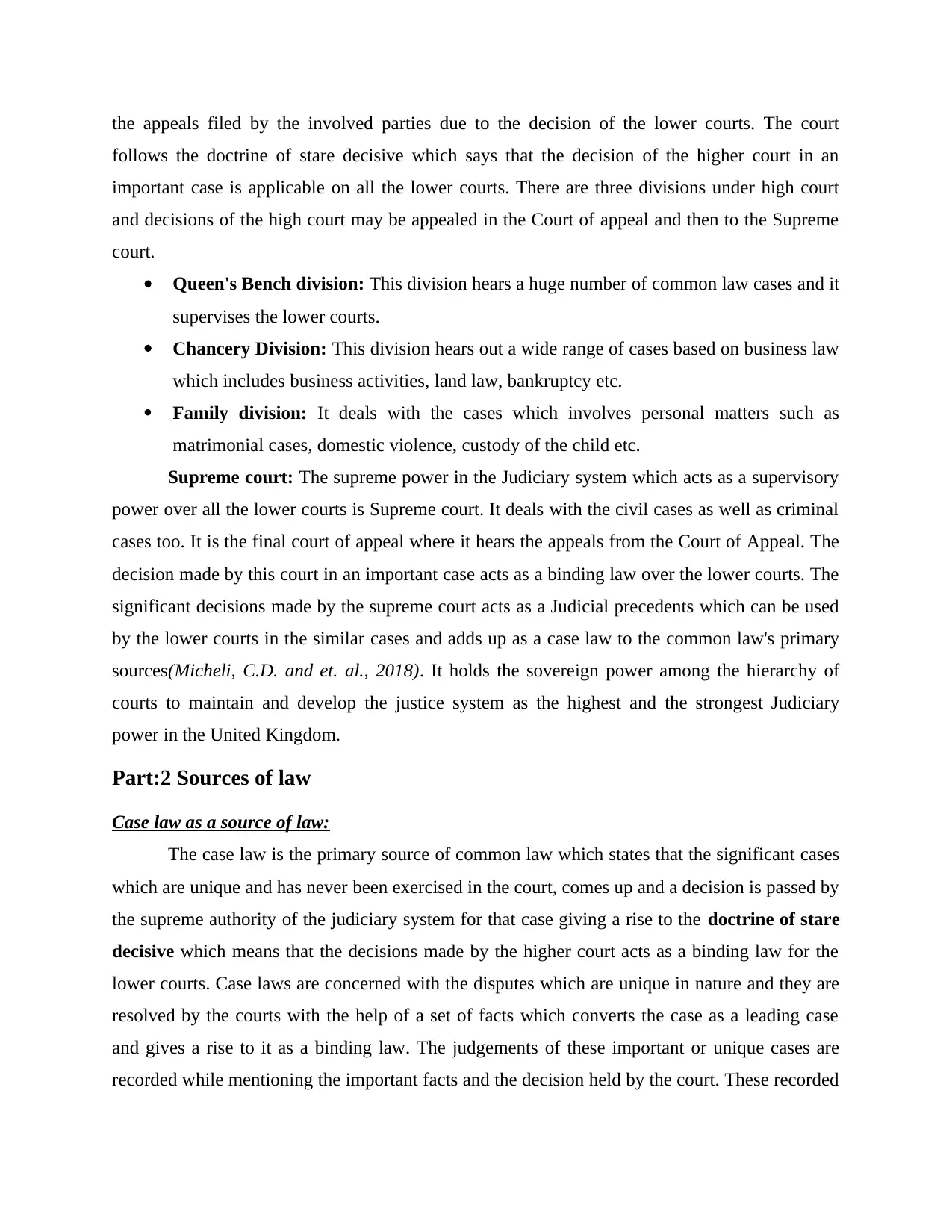
the appeals filed by the involved parties due to the decision of the lower courts. The court
follows the doctrine of stare decisive which says that the decision of the higher court in an
important case is applicable on all the lower courts. There are three divisions under high court
and decisions of the high court may be appealed in the Court of appeal and then to the Supreme
court.
Queen's Bench division: This division hears a huge number of common law cases and it
supervises the lower courts.
Chancery Division: This division hears out a wide range of cases based on business law
which includes business activities, land law, bankruptcy etc.
Family division: It deals with the cases which involves personal matters such as
matrimonial cases, domestic violence, custody of the child etc.
Supreme court: The supreme power in the Judiciary system which acts as a supervisory
power over all the lower courts is Supreme court. It deals with the civil cases as well as criminal
cases too. It is the final court of appeal where it hears the appeals from the Court of Appeal. The
decision made by this court in an important case acts as a binding law over the lower courts. The
significant decisions made by the supreme court acts as a Judicial precedents which can be used
by the lower courts in the similar cases and adds up as a case law to the common law's primary
sources(Micheli, C.D. and et. al., 2018). It holds the sovereign power among the hierarchy of
courts to maintain and develop the justice system as the highest and the strongest Judiciary
power in the United Kingdom.
Part:2 Sources of law
Case law as a source of law:
The case law is the primary source of common law which states that the significant cases
which are unique and has never been exercised in the court, comes up and a decision is passed by
the supreme authority of the judiciary system for that case giving a rise to the doctrine of stare
decisive which means that the decisions made by the higher court acts as a binding law for the
lower courts. Case laws are concerned with the disputes which are unique in nature and they are
resolved by the courts with the help of a set of facts which converts the case as a leading case
and gives a rise to it as a binding law. The judgements of these important or unique cases are
recorded while mentioning the important facts and the decision held by the court. These recorded
follows the doctrine of stare decisive which says that the decision of the higher court in an
important case is applicable on all the lower courts. There are three divisions under high court
and decisions of the high court may be appealed in the Court of appeal and then to the Supreme
court.
Queen's Bench division: This division hears a huge number of common law cases and it
supervises the lower courts.
Chancery Division: This division hears out a wide range of cases based on business law
which includes business activities, land law, bankruptcy etc.
Family division: It deals with the cases which involves personal matters such as
matrimonial cases, domestic violence, custody of the child etc.
Supreme court: The supreme power in the Judiciary system which acts as a supervisory
power over all the lower courts is Supreme court. It deals with the civil cases as well as criminal
cases too. It is the final court of appeal where it hears the appeals from the Court of Appeal. The
decision made by this court in an important case acts as a binding law over the lower courts. The
significant decisions made by the supreme court acts as a Judicial precedents which can be used
by the lower courts in the similar cases and adds up as a case law to the common law's primary
sources(Micheli, C.D. and et. al., 2018). It holds the sovereign power among the hierarchy of
courts to maintain and develop the justice system as the highest and the strongest Judiciary
power in the United Kingdom.
Part:2 Sources of law
Case law as a source of law:
The case law is the primary source of common law which states that the significant cases
which are unique and has never been exercised in the court, comes up and a decision is passed by
the supreme authority of the judiciary system for that case giving a rise to the doctrine of stare
decisive which means that the decisions made by the higher court acts as a binding law for the
lower courts. Case laws are concerned with the disputes which are unique in nature and they are
resolved by the courts with the help of a set of facts which converts the case as a leading case
and gives a rise to it as a binding law. The judgements of these important or unique cases are
recorded while mentioning the important facts and the decision held by the court. These recorded
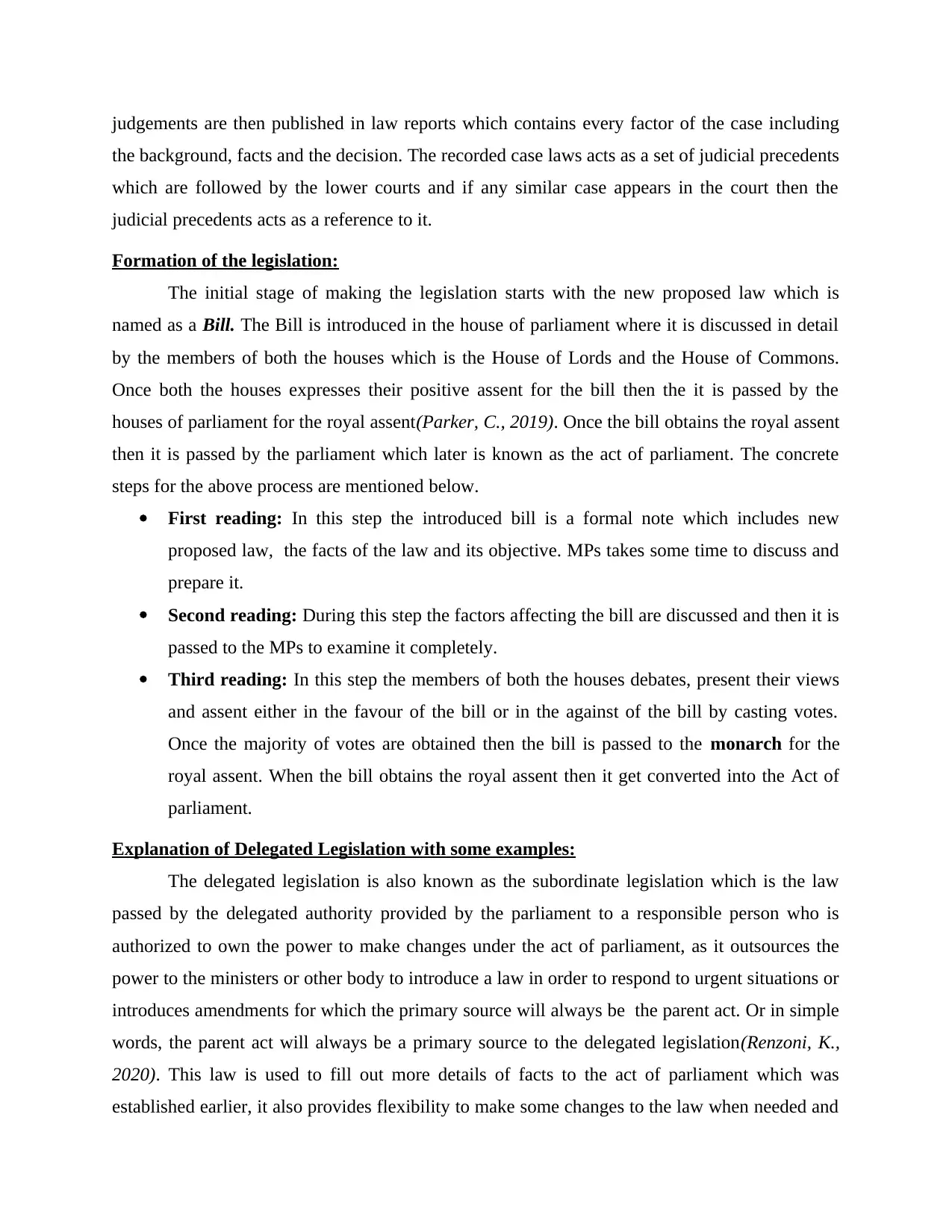
judgements are then published in law reports which contains every factor of the case including
the background, facts and the decision. The recorded case laws acts as a set of judicial precedents
which are followed by the lower courts and if any similar case appears in the court then the
judicial precedents acts as a reference to it.
Formation of the legislation:
The initial stage of making the legislation starts with the new proposed law which is
named as a Bill. The Bill is introduced in the house of parliament where it is discussed in detail
by the members of both the houses which is the House of Lords and the House of Commons.
Once both the houses expresses their positive assent for the bill then the it is passed by the
houses of parliament for the royal assent(Parker, C., 2019). Once the bill obtains the royal assent
then it is passed by the parliament which later is known as the act of parliament. The concrete
steps for the above process are mentioned below.
First reading: In this step the introduced bill is a formal note which includes new
proposed law, the facts of the law and its objective. MPs takes some time to discuss and
prepare it.
Second reading: During this step the factors affecting the bill are discussed and then it is
passed to the MPs to examine it completely.
Third reading: In this step the members of both the houses debates, present their views
and assent either in the favour of the bill or in the against of the bill by casting votes.
Once the majority of votes are obtained then the bill is passed to the monarch for the
royal assent. When the bill obtains the royal assent then it get converted into the Act of
parliament.
Explanation of Delegated Legislation with some examples:
The delegated legislation is also known as the subordinate legislation which is the law
passed by the delegated authority provided by the parliament to a responsible person who is
authorized to own the power to make changes under the act of parliament, as it outsources the
power to the ministers or other body to introduce a law in order to respond to urgent situations or
introduces amendments for which the primary source will always be the parent act. Or in simple
words, the parent act will always be a primary source to the delegated legislation(Renzoni, K.,
2020). This law is used to fill out more details of facts to the act of parliament which was
established earlier, it also provides flexibility to make some changes to the law when needed and
the background, facts and the decision. The recorded case laws acts as a set of judicial precedents
which are followed by the lower courts and if any similar case appears in the court then the
judicial precedents acts as a reference to it.
Formation of the legislation:
The initial stage of making the legislation starts with the new proposed law which is
named as a Bill. The Bill is introduced in the house of parliament where it is discussed in detail
by the members of both the houses which is the House of Lords and the House of Commons.
Once both the houses expresses their positive assent for the bill then the it is passed by the
houses of parliament for the royal assent(Parker, C., 2019). Once the bill obtains the royal assent
then it is passed by the parliament which later is known as the act of parliament. The concrete
steps for the above process are mentioned below.
First reading: In this step the introduced bill is a formal note which includes new
proposed law, the facts of the law and its objective. MPs takes some time to discuss and
prepare it.
Second reading: During this step the factors affecting the bill are discussed and then it is
passed to the MPs to examine it completely.
Third reading: In this step the members of both the houses debates, present their views
and assent either in the favour of the bill or in the against of the bill by casting votes.
Once the majority of votes are obtained then the bill is passed to the monarch for the
royal assent. When the bill obtains the royal assent then it get converted into the Act of
parliament.
Explanation of Delegated Legislation with some examples:
The delegated legislation is also known as the subordinate legislation which is the law
passed by the delegated authority provided by the parliament to a responsible person who is
authorized to own the power to make changes under the act of parliament, as it outsources the
power to the ministers or other body to introduce a law in order to respond to urgent situations or
introduces amendments for which the primary source will always be the parent act. Or in simple
words, the parent act will always be a primary source to the delegated legislation(Renzoni, K.,
2020). This law is used to fill out more details of facts to the act of parliament which was
established earlier, it also provides flexibility to make some changes to the law when needed and
⊘ This is a preview!⊘
Do you want full access?
Subscribe today to unlock all pages.

Trusted by 1+ million students worldwide
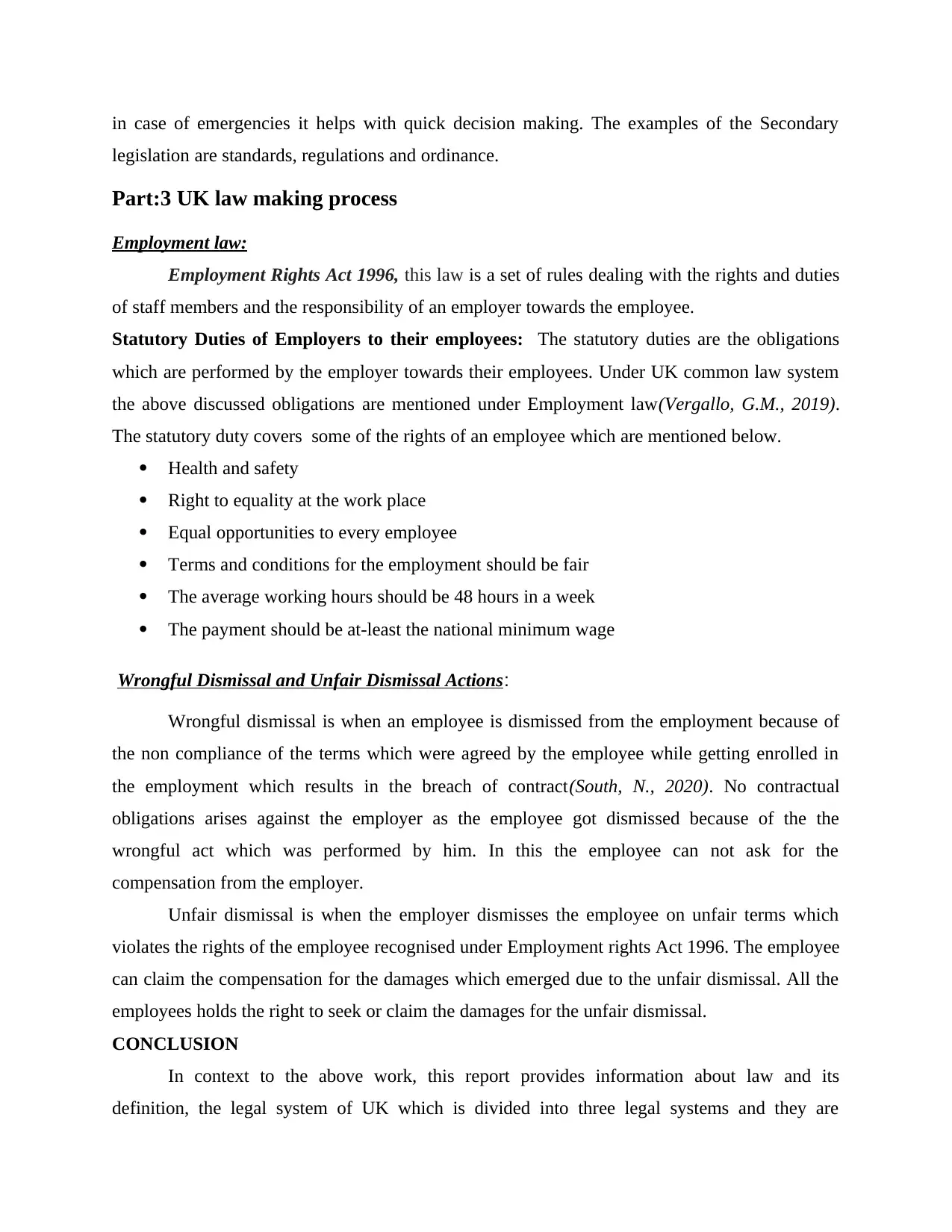
in case of emergencies it helps with quick decision making. The examples of the Secondary
legislation are standards, regulations and ordinance.
Part:3 UK law making process
Employment law:
Employment Rights Act 1996, this law is a set of rules dealing with the rights and duties
of staff members and the responsibility of an employer towards the employee.
Statutory Duties of Employers to their employees: The statutory duties are the obligations
which are performed by the employer towards their employees. Under UK common law system
the above discussed obligations are mentioned under Employment law(Vergallo, G.M., 2019).
The statutory duty covers some of the rights of an employee which are mentioned below.
Health and safety
Right to equality at the work place
Equal opportunities to every employee
Terms and conditions for the employment should be fair
The average working hours should be 48 hours in a week
The payment should be at-least the national minimum wage
Wrongful Dismissal and Unfair Dismissal Actions:
Wrongful dismissal is when an employee is dismissed from the employment because of
the non compliance of the terms which were agreed by the employee while getting enrolled in
the employment which results in the breach of contract(South, N., 2020). No contractual
obligations arises against the employer as the employee got dismissed because of the the
wrongful act which was performed by him. In this the employee can not ask for the
compensation from the employer.
Unfair dismissal is when the employer dismisses the employee on unfair terms which
violates the rights of the employee recognised under Employment rights Act 1996. The employee
can claim the compensation for the damages which emerged due to the unfair dismissal. All the
employees holds the right to seek or claim the damages for the unfair dismissal.
CONCLUSION
In context to the above work, this report provides information about law and its
definition, the legal system of UK which is divided into three legal systems and they are
legislation are standards, regulations and ordinance.
Part:3 UK law making process
Employment law:
Employment Rights Act 1996, this law is a set of rules dealing with the rights and duties
of staff members and the responsibility of an employer towards the employee.
Statutory Duties of Employers to their employees: The statutory duties are the obligations
which are performed by the employer towards their employees. Under UK common law system
the above discussed obligations are mentioned under Employment law(Vergallo, G.M., 2019).
The statutory duty covers some of the rights of an employee which are mentioned below.
Health and safety
Right to equality at the work place
Equal opportunities to every employee
Terms and conditions for the employment should be fair
The average working hours should be 48 hours in a week
The payment should be at-least the national minimum wage
Wrongful Dismissal and Unfair Dismissal Actions:
Wrongful dismissal is when an employee is dismissed from the employment because of
the non compliance of the terms which were agreed by the employee while getting enrolled in
the employment which results in the breach of contract(South, N., 2020). No contractual
obligations arises against the employer as the employee got dismissed because of the the
wrongful act which was performed by him. In this the employee can not ask for the
compensation from the employer.
Unfair dismissal is when the employer dismisses the employee on unfair terms which
violates the rights of the employee recognised under Employment rights Act 1996. The employee
can claim the compensation for the damages which emerged due to the unfair dismissal. All the
employees holds the right to seek or claim the damages for the unfair dismissal.
CONCLUSION
In context to the above work, this report provides information about law and its
definition, the legal system of UK which is divided into three legal systems and they are
Paraphrase This Document
Need a fresh take? Get an instant paraphrase of this document with our AI Paraphraser
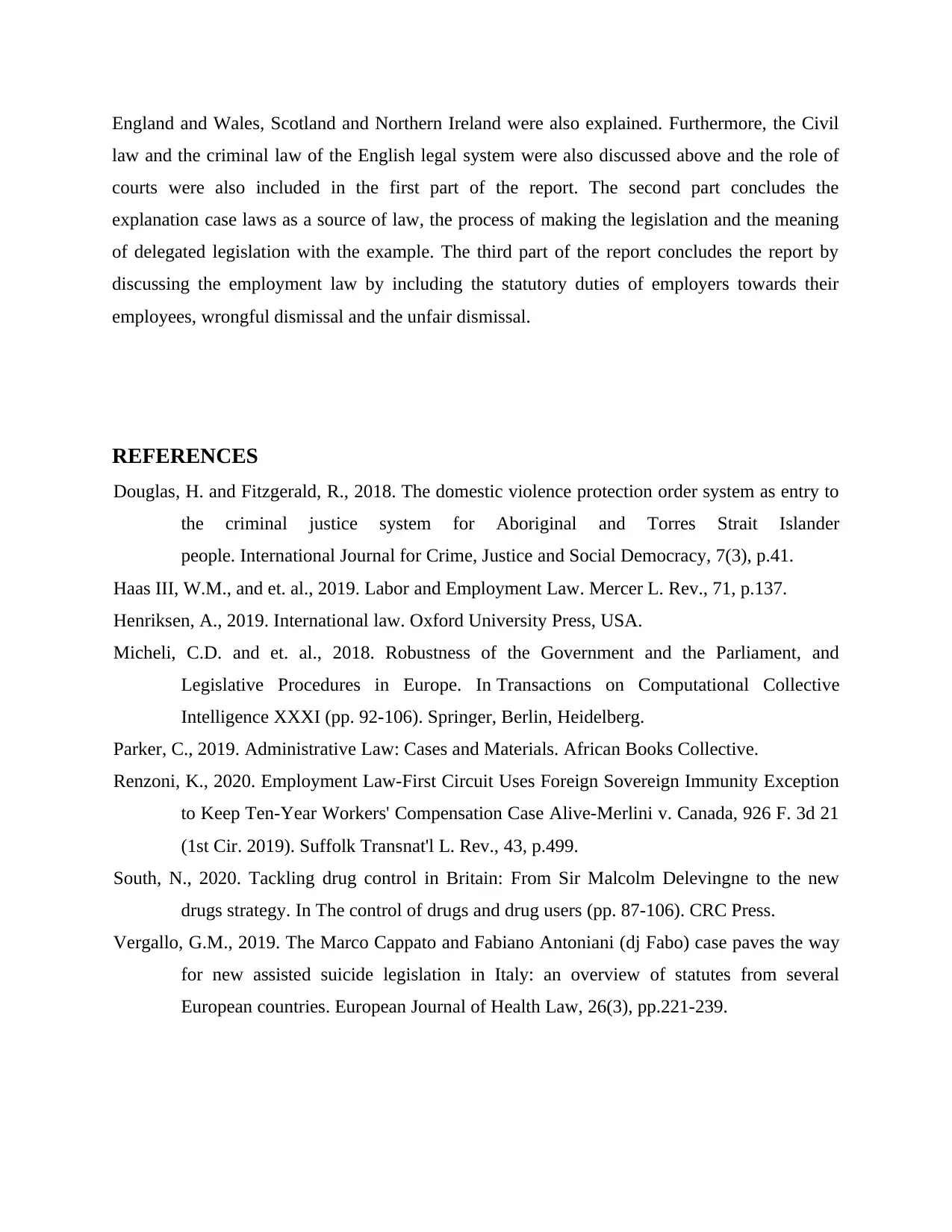
England and Wales, Scotland and Northern Ireland were also explained. Furthermore, the Civil
law and the criminal law of the English legal system were also discussed above and the role of
courts were also included in the first part of the report. The second part concludes the
explanation case laws as a source of law, the process of making the legislation and the meaning
of delegated legislation with the example. The third part of the report concludes the report by
discussing the employment law by including the statutory duties of employers towards their
employees, wrongful dismissal and the unfair dismissal.
REFERENCES
Douglas, H. and Fitzgerald, R., 2018. The domestic violence protection order system as entry to
the criminal justice system for Aboriginal and Torres Strait Islander
people. International Journal for Crime, Justice and Social Democracy, 7(3), p.41.
Haas III, W.M., and et. al., 2019. Labor and Employment Law. Mercer L. Rev., 71, p.137.
Henriksen, A., 2019. International law. Oxford University Press, USA.
Micheli, C.D. and et. al., 2018. Robustness of the Government and the Parliament, and
Legislative Procedures in Europe. In Transactions on Computational Collective
Intelligence XXXI (pp. 92-106). Springer, Berlin, Heidelberg.
Parker, C., 2019. Administrative Law: Cases and Materials. African Books Collective.
Renzoni, K., 2020. Employment Law-First Circuit Uses Foreign Sovereign Immunity Exception
to Keep Ten-Year Workers' Compensation Case Alive-Merlini v. Canada, 926 F. 3d 21
(1st Cir. 2019). Suffolk Transnat'l L. Rev., 43, p.499.
South, N., 2020. Tackling drug control in Britain: From Sir Malcolm Delevingne to the new
drugs strategy. In The control of drugs and drug users (pp. 87-106). CRC Press.
Vergallo, G.M., 2019. The Marco Cappato and Fabiano Antoniani (dj Fabo) case paves the way
for new assisted suicide legislation in Italy: an overview of statutes from several
European countries. European Journal of Health Law, 26(3), pp.221-239.
law and the criminal law of the English legal system were also discussed above and the role of
courts were also included in the first part of the report. The second part concludes the
explanation case laws as a source of law, the process of making the legislation and the meaning
of delegated legislation with the example. The third part of the report concludes the report by
discussing the employment law by including the statutory duties of employers towards their
employees, wrongful dismissal and the unfair dismissal.
REFERENCES
Douglas, H. and Fitzgerald, R., 2018. The domestic violence protection order system as entry to
the criminal justice system for Aboriginal and Torres Strait Islander
people. International Journal for Crime, Justice and Social Democracy, 7(3), p.41.
Haas III, W.M., and et. al., 2019. Labor and Employment Law. Mercer L. Rev., 71, p.137.
Henriksen, A., 2019. International law. Oxford University Press, USA.
Micheli, C.D. and et. al., 2018. Robustness of the Government and the Parliament, and
Legislative Procedures in Europe. In Transactions on Computational Collective
Intelligence XXXI (pp. 92-106). Springer, Berlin, Heidelberg.
Parker, C., 2019. Administrative Law: Cases and Materials. African Books Collective.
Renzoni, K., 2020. Employment Law-First Circuit Uses Foreign Sovereign Immunity Exception
to Keep Ten-Year Workers' Compensation Case Alive-Merlini v. Canada, 926 F. 3d 21
(1st Cir. 2019). Suffolk Transnat'l L. Rev., 43, p.499.
South, N., 2020. Tackling drug control in Britain: From Sir Malcolm Delevingne to the new
drugs strategy. In The control of drugs and drug users (pp. 87-106). CRC Press.
Vergallo, G.M., 2019. The Marco Cappato and Fabiano Antoniani (dj Fabo) case paves the way
for new assisted suicide legislation in Italy: an overview of statutes from several
European countries. European Journal of Health Law, 26(3), pp.221-239.

⊘ This is a preview!⊘
Do you want full access?
Subscribe today to unlock all pages.

Trusted by 1+ million students worldwide

1 out of 10
Related Documents
Your All-in-One AI-Powered Toolkit for Academic Success.
+13062052269
info@desklib.com
Available 24*7 on WhatsApp / Email
![[object Object]](/_next/static/media/star-bottom.7253800d.svg)
Unlock your academic potential
Copyright © 2020–2026 A2Z Services. All Rights Reserved. Developed and managed by ZUCOL.

